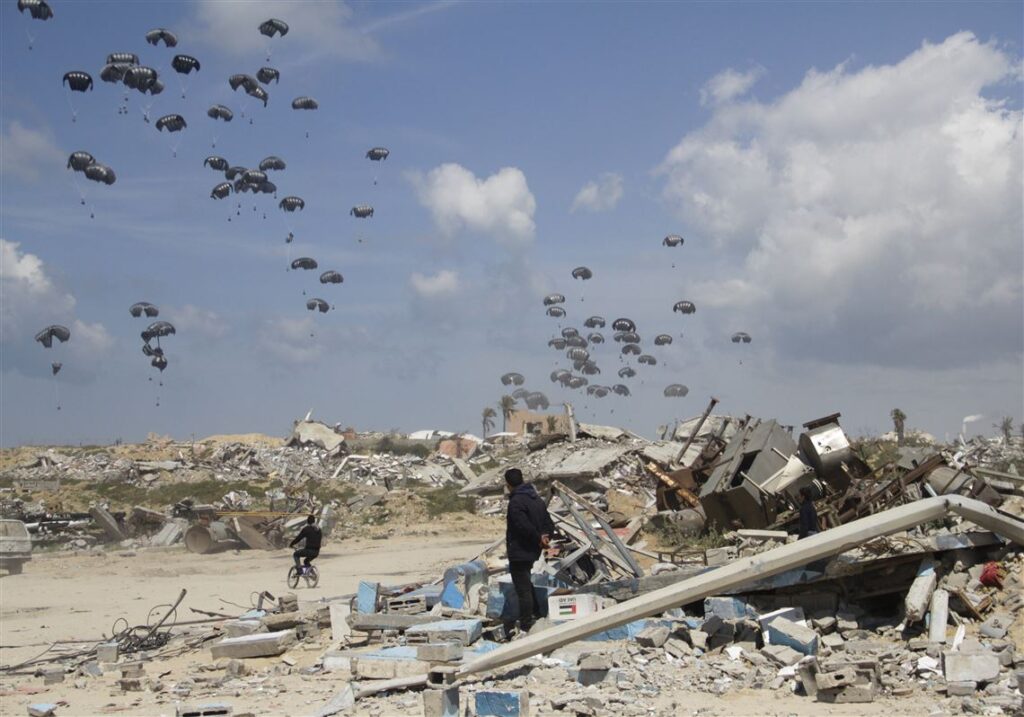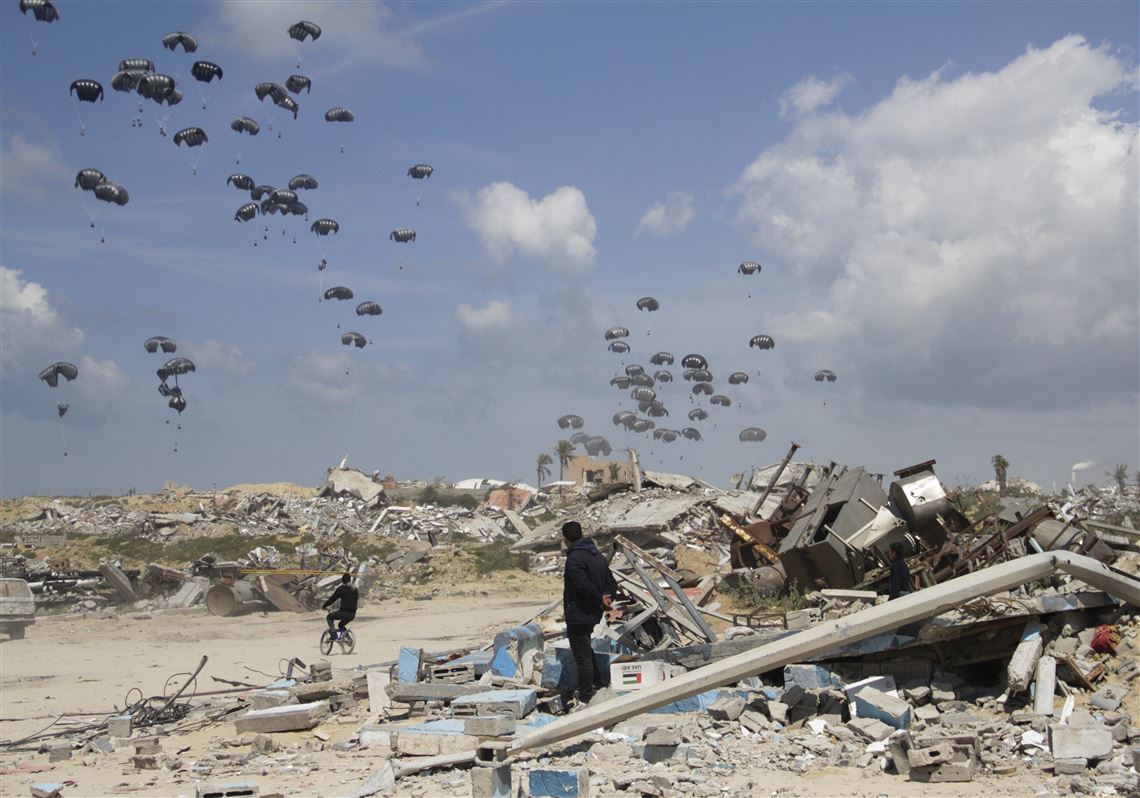
JERUSALEM (AP) — The major ally of Israel, the United States, decided not to reject a U.N. Security Council resolution that called for a cease-fire in Gaza, and Israeli Prime Minister Benjamin Netanyahu criticized the decision on Tuesday. He pledged to continue the conflict and claimed that the resolution had given Hamas more confidence.
Both Israel and Hamas have rebuffed international efforts to establish a cease-fire as the war enters its sixth month, each believing that its brand of victory is achievable. Tensions over how the war is being conducted between the United States and Israel have also increased as a result of the U.N. resolution’s passing.
According to Netanyahu, Israel must extend its ground offensive to the southern city of Rafah, where more than half of Gaza’s population has sought refuge—many of them in cramped tent camps—if it is to succeed in its goals of overthrowing Hamas and freeing numerous captives. A significant attack on Rafah would be erroneous, according to the U.S.
According to Hamas, the group would not release the hostages until Israel grants a longer-term cease-fire, removes its troops from Gaza, and frees hundreds of Palestinian detainees, including senior militants. It announced late on Monday that it had rejected a recent proposal that did not meet those conditions. Had those requests been met, it would have been able to claim an incredibly expensive triumph.
In a statement, Netanyahu stated that the declaration “served as unfortunate testimony to the damage of the Security Council decision and proved clearly that Hamas is not interested in continuing negotiations toward a deal.”
“Israel shall not yield to the irrational demands of Hamas and shall persist in its efforts to accomplish all the objectives of the conflict, including the liberation of all hostages, the destruction of Hamas’ governing and military capacities, and the guarantee that Gaza will never again pose a threat to Israel.”
The Health Ministry in Gaza reports that Israel has killed over 32,000 Palestinians, with women and children making up over two thirds of the casualties. The ministry does not differentiate between combatants and civilians when tallying casualties. A third of the 2.3 million people living in the Gaza Strip are on the verge of starvation as a result of the conflict, which has left much of the region in ruins.
The Israeli military declared on Tuesday that Marwan Issa, the deputy head of Hamas’ armed branch in Gaza and a planner of the Oct. 7 attack, had been killed in an airstrike earlier this month. Since the commencement of the conflict, Issa is the highest-ranking Hamas leader to be slain in Gaza. Issa was killed on March 9 or 10, according to military spokesman Rear Adm. Daniel Hagari, when fighter jets attacked a subterranean facility in central Gaza.
According to hospital records and the relatives of the deceased, at least 16 persons were murdered in an Israeli hit that occurred late on Monday on a residential building in Rafah where three displaced families were seeking shelter. Among the victims were four women and nine children. Witnessed by an Associated Press reporter, the remains were brought to a hospital.
Netanyahu has pledged to continue Israel’s offensive following any hostage release and to fight until the terrorist organization is destroyed in response to Hamas’ demands for a longer-term cease-fire. However, he has not elaborated much on what might come after such a victory and has mainly disapproved of the postwar vision presented by the U.S.
His strategy has put him at open odds with the administration of President Joe Biden, who has voiced growing concern over civilian losses yet continuing to provide Israel with vital military support and support Israel’s goal of eliminating Hamas.
The U.N. Security Council resolution that was passed on Monday further widened the rifts. The resolution did not attach any requirements to the cease-fire, instead calling for the release of all captives detained in Gaza. In Monday’s vote, the Biden administration abstained, allowing the resolution to succeed, despite having previously rejected previous UN resolutions requesting a cease-fire.
In retaliation, Netanyahu called off an Israeli delegation’s scheduled trip to Washington, D.C., where the U.S. side was supposed to offer alternatives to a ground invasion in Rafah.
Israeli media criticized Netanyahu over the action, claiming that he was putting Israel’s most vital partnership under pressure to appease hard-liners in his coalition of choice.
“He is willing to jeopardize Israel’s diplomatic ties with the US in order to secure a transient political media coup. Ben Caspit, a well-known commentator for the Israeli weekly Maariv, stated, “He has completely lost it.”
He claimed that by delaying ensuring that additional humanitarian aid reaches Gaza and creating post-war plans, Netanyahu has been taxing the patience of the United States. Now, instead of making every effort to appease them, he is thrashing around like a toddler having a fit.
While on a separate trip to Washington, Israeli Defense Minister Yoav Gallant met with Secretary of State Antony Blinken and other senior defense officials in the United States on Tuesday.
U.S. Defense Secretary Lloyd Austin called humanitarian delivery to Gaza “far too low” and civilian casualties “far too high” prior to the conference. However, he also restated the notion that the United States would always support Israel and that it has the right to self-defense.
According to Gallant, he informed Blinken that “Israel will not cease operating in Gaza until all of the hostages return.” This war cannot be ended without a resounding triumph.
Ismail Haniyeh, the chairman of Hamas, claimed that the U.N. vote demonstrated that Israel was “losing its political cover” at the Security Council and was facing “an unprecedented (level of) political isolation.” After meeting with Iranian officials, he gave a statement at a press conference in Tehran.
On October 7, militants led by Hamas broke through the border and attacked communities in southern Israel, murdering about 1,200 people—mostly civilians—and kidnapping about 250 more. This marked the start of the conflict. After the majority of the hostages were released in November in exchange for the release of Palestinian prisoners, it is still thought to be keeping over 100 hostages and the bodies of another thirty.
The negotiations for another cease-fire and hostage release, which the US, Qatar, and Egypt have been engaged in for several weeks, seem to have reached a dead end.
The conversations are still under progress, Majed al-Ansari, a spokesman for Qatar’s Foreign Ministry, which is presently holding the discussions, informed reporters without offering any specifics.
In exchange for an unconditional Israeli withdrawal from Gaza, the opening of its borders to aid and reconstruction, and the release of hundreds of Palestinian prisoners, including high-ranking militants serving life sentences, Hamas has previously proposed a phased process in which it would release all remaining hostages.

